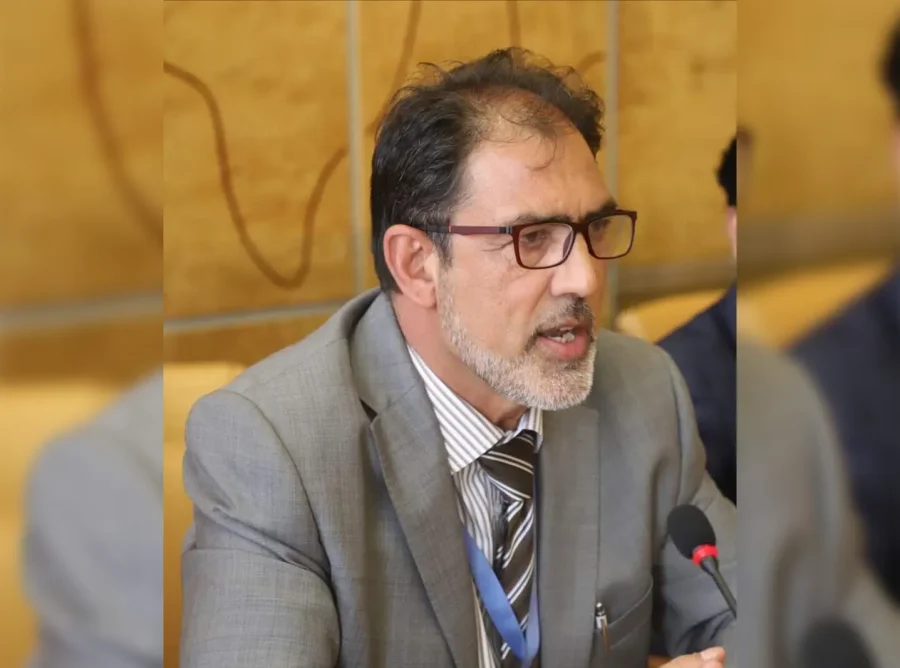Kashmiri representative Altaf Hussain Wani has said that Pakistan’s consistent and continued support of the Kashmiris’ legitimate cause has always been a source of great strength and encouragement to the people of Indian illegally occupied Jammu and Kashmir.
Altaf Hussain Wani in his statement issued after addressing the Organisation of Islamic Cooperation (OIC) Kashmir Contact Group meeting, said Be it the Kashmiris’ decades’ long struggle against Dogra Maharaja or their ongoing battle against the Indian colonialism of Kashmir, the Muslims of the subcontinent have always stood in support and solidarity of their Kashmiri brethren.
He said prominent leaders of the Pakistan movement, including Dr Allama Muhammad Iqbal, the Poet of the East, and the Founding Father Muhammad Ali Jinnah, have not only championed the cause of Kashmir but also deemed Kashmir as an integral part of Pakistan and raised the issue at every forum.
He said when the Viceroy of India visited Kashmir in 1924, a memorandum was presented to him by some Kashmiri leaders that highlighted the plight of the Muslims. The memorandum was prepared on the advice of Allama Muhammad Iqbal.
Similarly, the All India Muslim League meeting held in May 1929 adopted a resolution in support of the Kashmiri Muslims and the resolution was moved by Dr. Allama Iqbal, he added.
Altaf Wani said the establishment of the All-India Kashmir Committee in 1931 to provide political, social, moral and financial support to the Muslims of Kashmir, was yet another important milestone of the brotherhood with far-reaching consequences.
Pertinently, the Kashmir Committee celebrated “Kashmir Day” on August 14, 1931 as an expression of sympathy for the demoralized Kashmiris who were reeling under the ruthless brutality of the Maharaja, he maintained.
The Pakistani state, since the very beginning, remained an uncompromising sympathizer and supporter of the Kashmiris at every stage of their rights struggle, he added.
He said in 1947, when India invaded Jammu and Kashmir and landed its troops in Srinagar, the Pakistani government reacted strongly and swiftly to India’s naked aggression, which ultimately led to the first war between India and Pakistan.
He said Quaid-e-Azam Muhammad Ali Jinnah’s interview with the BBC on 13the December, 1947 perfectly explains his stance on Kashmir.
Altaf Wani said, rejecting the Indian government’s contention on the issue, Mr. Jinnah, while demanding the withdrawal of the Indian occupation forces from Kashmir, made it abundantly clear that Pakistan cannot be expected to either accept the illegal occupation of Kashmir by India or be a party to its perpetuation.
He said that the question of a plebiscite in Kashmir cannot be discussed under the prevailing circumstances unless the puppet regime headed by the henchmen of New Delhi is replaced by a truly representative government administration of Kashmir.
The government of Pakistan, he said, lodged a strong protest against Indian aggression. As a result, the then Indian Prime Minister Jawaharlal Nehru had to assure his Pakistani counterpart Mr. Liaquat Ali Khan that the Kashmiri people would be given the opportunity to decide freely whether they wanted to join India or Pakistan.
Meanwhile, India rushed to the UN Security Council and lodged a complaint against the alleged “aggression” by the Pakistani state. At the UN, the Pakistani mission under the stewardship of foreign minister Zaffarullah Khan played an important role in securing a resolution calling for a referendum in Kashmir, he maintained.
On January 5, 1949, the UN passed a historic resolution which stated that the question of the accession of the State of Jammu and Kashmir to India or Pakistan would be decided through the democratic method of a free and impartial plebiscite, he said, adding the resolution, besides acknowledging Kashmiris’ right to self-determination, suggested that the future of Kashmir should be decided by the people of Kashmir through a plebiscite.—KMS









